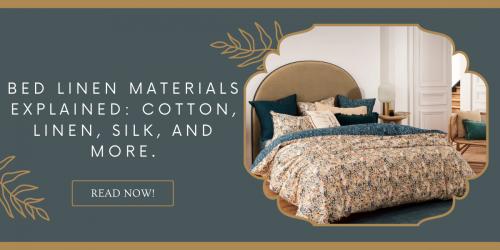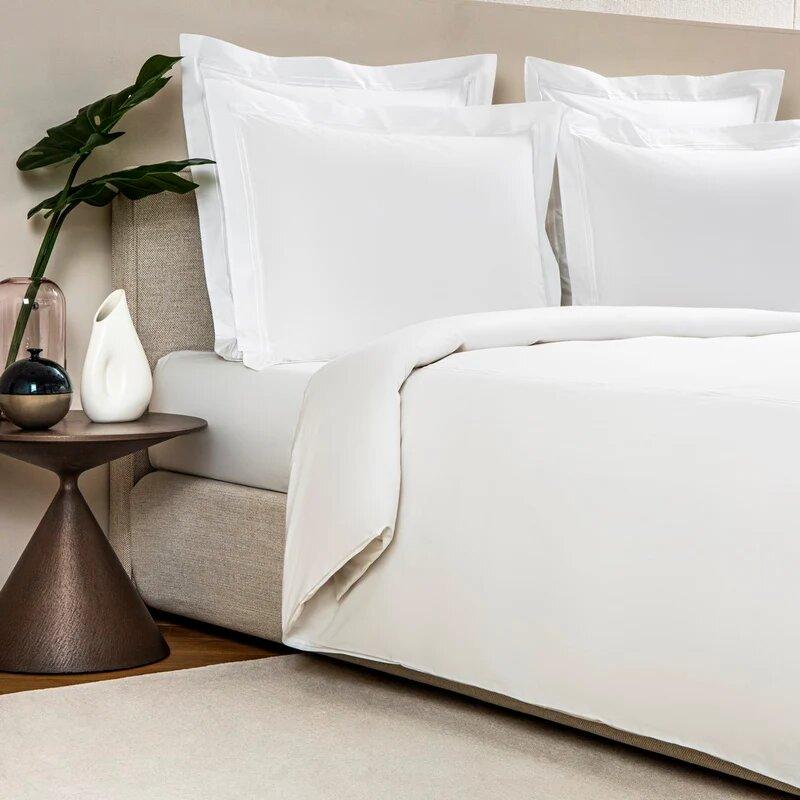Bed Linen Materials Explained: Cotton, Linen, Silk, and more.

When it comes to creating a comfortable and inviting sleep environment, the choice of bed linen materials plays a crucial role. From classic cotton to luxurious silk and innovative alternatives, understanding the characteristics and benefits of different materials can help you make an informed decision when selecting bed linen for your home. Today, we'll decode the world of bed linen materials, exploring the unique qualities of cotton, linen, silk, and beyond.
Cotton: The Classic Choice
Cotton is the quintessential choice for bed linen, cherished for its softness, breathability, and versatility. As one of the most popular bedding materials, cotton offers a host of benefits that contribute to a comfortable and restful sleep experience.
One of the key advantages of cotton bed linen is its natural breathability, which helps regulate body temperature and wick away moisture for a cool and comfortable night's sleep. Additionally, cotton is hypoallergenic, making it an ideal choice for individuals with sensitive skin or allergies.
When shopping for cotton bed linen, you may come across different types of cotton, such as Egyptian cotton and Pima cotton. Egyptian cotton is renowned for its superior quality and long staple fibres, resulting in a softer and more luxurious feel. Pima cotton, also known as Supima cotton, shares similar characteristics and is prized for its exceptional durability and smooth texture.
In terms of care, cotton bed linen is relatively low-maintenance and easy to launder. With proper care, cotton bed linen can withstand frequent washing and retain its softness and durability over time, making it a practical and long-lasting investment for your bedroom.
Linen: Timeless Elegance and Cool Comfort
Linen exudes timeless elegance and offers a luxurious yet understated aesthetic. Made from the fibres of the flax plant, linen is prized for its natural texture, durability, and coolness, making it an excellent choice for warm climates or hot sleepers.
One of the distinctive qualities of linen is its breathability, which allows air to circulate freely and helps regulate body temperature for a comfortable night's sleep. Additionally, its natural moisture-wicking properties absorb excess moisture and keep you feeling dry and refreshed throughout the night.
Its unique texture is characterised by natural creases and a relaxed aesthetic. These wrinkles add to the charm of linen bedding, giving it a casual yet sophisticated look that complements a variety of bedroom styles.
While linen may require a bit more care compared to cotton, with proper washing and drying techniques, it can maintain its softness and durability for years to come. To preserve the natural texture and drape of linen, it's recommended to line dry or tumble dry on a low heat setting.
Silk: The Epitome of Luxury
Silk bed linen embodies luxury and indulgence, offering a sumptuously smooth and silky texture that is unmatched by any other material. Silk is prized for its luxurious feel, hypoallergenic properties, and temperature-regulating benefits.
One of the most notable characteristics of silk bed linen is its incredibly smooth and gentle texture, which glides effortlessly over the skin and hair for a truly luxurious sleep experience. Silk is also naturally hypoallergenic and resistant to dust mites, mould, and mildew, making it an excellent choice for individuals with allergies or sensitive skin.
In addition to its luxurious feel, silk bed linen offers excellent temperature regulation, keeping you cool in the summer and warm in the winter. Silk has natural moisture-wicking properties, absorbing excess moisture and keeping you dry and comfortable throughout the night.
While silk bed linen may require special care compared to other materials, the luxurious feel and benefits it provides make it well worth the investment. To prolong the life of silk bed linen, it's recommended to hand wash or machine wash on a gentle cycle with mild detergent and avoid wringing or twisting the fabric.
Beyond Traditional Materials: Innovative Options
In addition to cotton, linen, and silk, there are a variety of innovative materials available for bed linen that offer unique benefits and features.
Bamboo bed linen is made from the fibres of the bamboo plant and is prized for its softness, breathability, and sustainability. Bamboo fibres are naturally moisture-wicking and antimicrobial, making them an excellent choice for individuals with allergies or sensitive skin.
Tencel bed linen is made from the fibres of sustainably sourced wood pulp and offers exceptional softness, durability, and moisture-wicking properties. Tencel fibres are eco-friendly and biodegradable, making them a sustainable choice for environmentally conscious consumers.
Microfiber bed linen is made from ultra-fine synthetic fibres and is known for its softness, durability, and affordability. Microfiber bed linen is easy to care for and resistant to wrinkles, shrinking, and fading, making it a practical choice for busy households.
When exploring alternative bed linen materials, it's essential to consider factors such as breathability, durability, and sustainability to ensure you find the right option for your needs and preferences.
Choosing the Right Material for You
When selecting bed linen materials, it's essential to consider factors such as sleep preferences, climate, and budget to find the right option for your needs. If you prefer a soft and versatile material that is easy to care for, cotton bed linen may be the ideal choice for you. Cotton offers excellent breathability, durability, and hypoallergenic properties, making it suitable for a wide range of sleepers.
For those seeking a luxurious and sophisticated aesthetic with excellent temperature regulation, linen may be the perfect option. Linen offers natural breathability, moisture-wicking properties, and a relaxed texture that adds character to any bedroom.
If you crave the ultimate indulgence and luxury, silk bed linen may be the perfect choice for you. Silk offers unparalleled softness, hypoallergenic properties, and temperature regulation, providing a truly luxurious sleep experience.
Alternatively, if you're interested in exploring innovative materials that offer unique benefits and features, bamboo, Tencel, and microfiber bed linen may be worth considering. These materials offer softness, durability, and sustainability, providing a practical and eco-friendly choice for modern consumers.
Conclusion
Choosing the right bed linen materials is essential for creating a comfortable and inviting sleep environment. Whether you prefer the classic comfort of cotton, the timeless elegance of linen, the luxurious indulgence of silk, or the innovative features of alternative materials, there's a perfect option available to suit your needs and preferences.
By understanding the unique qualities and benefits of different bed linen materials, you can make an informed decision when selecting bedding for your home. Whether you prioritise breathability, durability, sustainability.








Comments